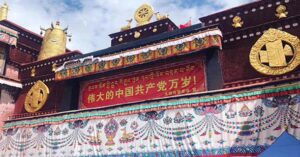 Tibetan Buddhists face the highest levels of religious persecution in China, along with Uighur Muslims* and Falun Gong practitioners**, according to a report published by the Council on Foreign Relations.
Tibetan Buddhists face the highest levels of religious persecution in China, along with Uighur Muslims* and Falun Gong practitioners**, according to a report published by the Council on Foreign Relations.
Article 36 of the Chinese Constitution provides that “[c]itizens of the People’s Republic of China enjoy freedom of religious belief.” China is also a party to several international human rights treaties that endorse the right to freedom of religion and belief. However, the Chinese government’s crackdown on religion and belief is ongoing as China contravenes its own constitution by violating the basic human right of freedom of religion.
One of these contraventions is currently in the news: Chinese officials have stated they will select Tibetan Buddhist leaders, including a future 15th Dalai Lama. The United States Tibet Policy and Support Act of 2019, which, if passed into law, will ratify and strengthen the original Tibetan Policy Act of 2002, states the US intention to prevent China’s interference in the reincarnation system of Tibet. Other contraventions of the right to human rights and religious freedom addressed by the Act include the Chinese government’s refusal to enter into a dialogue with Tibetan leaders, and the policies in Tibet which, says the Act, are degrading Tibetan religion, culture, language, livelihoods and the environment.
The Chinese Government restricts a number of religious activities. School children and students in the Tibetan Autonomous Region (TAR) are banned from participating in many religious practices and from attending informal Tibetan classes taught by monks. In August last year, a Lhasa school required parents to sign a compulsory “responsibility agreement” stating that “students must be stopped from attending various religious activities.” For many Tibetan students, Buddhism can only be studied in a language that is not Tibetan. People are routinely detained for possessing a photo of His Holiness the Dalai Lama. Human rights defenders, working to protect people targeted for their faith, may be arrested, or just disappear.
In early 2012, several thousand Tibetans were subjected detention and “re-education” after travelling to India on pilgrimage to attend teachings by His Holiness the Dalai Lama. A notice released recently to local authorities mandates them to report all retired Tibetan government employees who perform Kora [circumambulation, a Buddhist religious ritual] in August, saying that it is “a problem to be removed”. Sophie Richardson, China Director of Human Rights Watch, said, “Chinese government authorities are relentless in their quest to control all aspects of Tibetans’ religious practices. Even those who spent their lives in service to the government aren’t spared […] The government should immediately reverse its campaign to punish people for exercising their fundamental rights.” Although the notice mentioned above specifically mentions Kora, the ban applies to any visible religious activity by retired government workers, including visiting temples and monasteries, participating in prayer assemblies and other events for lay devotees, or making religious donations.
The Chinese government continues to use advanced surveillance technology and other measures to repress Tibetan Buddhists. In 2015, China’s National Development and Reform Commission launched Sharp Eyes, a programme with the goal of achieving 100 percent video coverage of “key public areas” and “key industries” by 2020 and has led to the installation of millions of cameras across the country. Chinese advocates of comprehensive surveillance claim that it can help deter crime or violent extremism, but the government uses it to monitor commonplace religious behaviour, houses of worship and specific religious minorities, regardless of their criminal record. Facial recognition technology has been integrated into much of this surveillance network and used to identify Tibetans and Uighurs.
A team of journalists from the New York Times and other media outlets published a report in July last year about Fengcai, an app routinely installed on the smartphones of travellers entering China from Central Asia. The app checks content on each phone, officially looking for items related to known terrorist groups, but the list of content flagged up also includes items related to mainstream and nonviolent religious practice, such as audio recordings of Qur’an verses recited by prominent clerics and writings by His Holiness the Dalai Lama.
The US Commission on International Religious Freedom (USCIRF) has designated China as a Tier 1 “Country of Particular Concern”(CPC): this designation includes any country engaging in systematic, ongoing, egregious violations of religious freedom and is based on the Universal Declaration of Human Rights and other international documents. China has been ranked second of the top ten CPCs. USCIRF recommends that the US government support legislation that would increase restrictions on the export to China from the United States of advanced technology—including surveillance and biometric equipment—that has enhanced the Chinese government’s capacity to monitor and harass religious and ethnic communities; USCIRF has also recommended raising the profile of religious freedom in the US-China relationship.
* Ethnic minority Muslims living in Chinese controlled East Turkestan, or Xinjiang, who are subjected to similar oppression to that experienced by Tibetans living in Tibet
**Falun Gong is a Chinese religious spiritual practice that combines meditation and moral philosophy




 Print
Print Email
Email